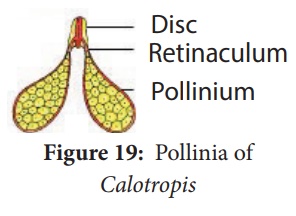Experiments | Botany Practicals - To dissect and display the pollinia of Calotropis | 12th Botany : Practicals
Chapter: 12th Botany : Practicals
To dissect and display the pollinia of Calotropis
Experiments
Exercise : To dissect and display the pollinia of
Calotropis
Aim:
To dissect and observe
the structure of pollinia and understand the mechanism of pollination in Calotropis
flowers. (Translator Mechanism)
Principle:
In Calotropis the
pollen in each anther lobe of a stamen unites into a mass, forming a pollinium.
Requirements:
Flowers of Calotropis,
dissection needle, dissection microscope ,slide, blade, glycerine, coverslip,
scissors.

Procedure:
Take a mature flower of Calotropis.
Observe the parts of the flower and remove the calyx and corolla with the help
of scissors. Identify the pentangular stigmatic disc. Insert the needle at the
angles of the stigma where the pollinia are adhered. Dissect it and place the
pollinia on a clean slide. Mount it in glycerine and place a coverslip on it.
Observe the pollinia under the dissection microscope and record your
observation.
Observation:
The stamens of Calotropis
produce pollinium. Two pollinia are found attached to a glandular adhesive disc
called corpusculum by a thread like structure called retinaculum. The whole
structure looks like inverted letter ŌĆśYŌĆÖ and is called translator. The sticky
disc gets attached with the legs of pollinator (bees or butterflies) and is
carried to the stigma of another flower, thus ensuring pollination.
Inference:
The structure of
pollinia of Calotropis is well suited to achieve pollination.
Related Topics